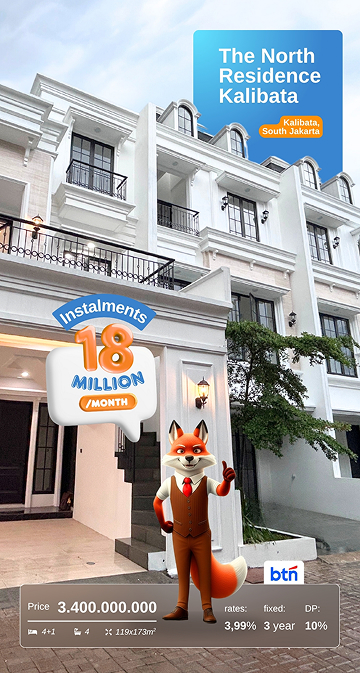If you are currently paying off a mortgage and are thinking of transferring it to another bank, this is entirely possible. It is common to decide to transfer your mortgage, usually from a conventional bank to an Islamic (syariah) bank or vice versa.
Another factor is the difference in floating interest rates between banks. For example, when you purchase a home and make mortgage payments, the flat interest rate for the first 3 years may only be 5%, but the floating interest rate can reach 15% after 3 years. Meanwhile, at another bank, the mortgage may offer a flat interest rate for 10 years. In the long run, the total cost of paying off your home will be lower.
Of course, this is very advantageous, isn’t it? Learn more about how to transfer your mortgage, the benefits, requirements, and differences from a mortgage takeover.
How to Transfer Your Mortgage
Ready to apply for a mortgage transfer? The first step is to visit the bank where you originally took out your mortgage, as well as the bank where you plan to transfer it.
At the old bank, submit a request to stop paying your mortgage to the party handling the mortgage process. In this case, it could be the marketing department or the relevant bank officer. Usually, the bank will ask for your reason, and you will also have to fill out some forms.
Just follow the process, and when it is complete, the mortgage will be cancelled and ready to be transferred to the bank of your choice. Make sure the new mortgage offers an interest rate scheme that suits your needs.
After that, visit the new bank once the process at the old bank is complete. You will essentially be entering into a new loan agreement at the new bank. Typically, a notary will assist with this process.
The notary will help with the process, including the preparation of the Sales and Purchase Agreement (APJB) and Power of Attorney. All these procedures may take several weeks or even months. Usually, the old bank will be quite slow and time-consuming in this process, so begin several months before the interest rate at the old bank switches to floating.
Requirements for Transferring a Mortgage
To transfer a mortgage from one bank to another, certain requirements involving official documents are needed. Most of these are similar to when you first applied for a mortgage:
- Copy of ID Card: ID card of the applicant (and spouse if married)
- Copy of Family Card (KK)
- Copy of Marriage Certificate/Divorce Certificate/Death Certificate: If married, divorced, or the spouse has passed away
- Photocopy of NPWP: Taxpayer Identification Number
- Pay Slip: For employees, original pay slips for the last 3 months
- Work Certificate: For employees, from HRD or supervisor
- Financial Statements: For business owners or professionals, financial statements for the last 2 years or a business licence
- Copy of Bank Statement: Bank statement for the last 3 months
- Statement Letter: Statement regarding loan facilities from the previous bank
Documents Related to Mortgage:
- Copy of Credit Agreement with the previous bank
- Copy of House Certificate with bank stamp
- Copy of Building Construction Permit (IMB)/Building Approval (PBG)
- Copy of Land and Building Tax (PBB) proof of payment
- Copy of Mortgage Payment Proof of the latest instalment
- Clearance Letter (OS) from the previous bank stating that the mortgage instalments have been fully paid
- Take Over Application Form: Provided by the new bank
- Copy of Sales and Purchase Agreement (AJB) & Deed of Mortgage (APHT): If available
- Other documents requested by the new bank
Benefits of Transferring a Mortgage to Another Bank
Transferring a mortgage from one bank to another has many advantages. While the process can be cumbersome, it allows you to save on costs and pay lower instalments than before. Here are some of the benefits:
1. Avoid Floating Interest Rates
The interest rates at your original bank and the bank you want to continue your mortgage with can be very different. As explained earlier, your old bank’s interest rate may increase in the fifth year, while the new bank offers a flat rate for 10 years. In addition, banks often promote special rates for new customers. This can significantly reduce your instalment burden.
2. Additional Promotions
Some banks offer special promotions for homeowners taking out a mortgage. These may include cashback or even direct gifts such as household items.
3. Cost Savings
When taking out a mortgage, it is essential to carefully calculate and secure the most economical total cost. If switching from the old bank to the new bank reduces the total mortgage payment amount, this is undoubtedly advantageous, isn’t it?
4. Flexibility in Payments
The future is unpredictable. Given the current economic challenges, we may suddenly lose our jobs or income sources. In such situations, it may become difficult to continue mortgage payments, prompting you to consider transferring your mortgage to a bank that offers more flexible payment terms and lower instalments.
5. Services and Facilities
In addition to payment processes, sometimes the services provided by a bank may also prompt a mortgage switch. If another bank offers better convenience and services, then it is perfectly reasonable to make the change.
Disadvantages of Switching Bank Mortgages
Of course, in addition to the advantages, there are also drawbacks to switching mortgages:
1. Paying Mortgage Penalties
Some banks impose penalties if the homeowner decides to discontinue the mortgage. The amount varies. Therefore, calculate all the costs first. If the penalty is smaller than the total programme cost and you still make a profit, then go ahead with the transfer.
2. Lengthy and Complex Process
This transfer process is not to be taken lightly, as it involves banks and legal documentation. It can take a considerable amount of time. To prepare, start the process several months before your old bank’s mortgage rate becomes variable.
Difference Between Mortgage Transfer and Mortgage Takeover
At first glance, a mortgage transfer seems the same as a mortgage takeover, but they are quite different. A mortgage transfer involves moving your mortgage from one bank to another. Meanwhile, a mortgage takeover occurs when an individual or entity takes over an existing mortgage from the previous owner. In summary, a mortgage transfer involves the same homeowner, while a mortgage takeover involves a change in ownership.
There is also an informal mortgage takeover, where the process is conducted without officially involving the bank. The transaction is handled directly between the seller and the buyer’s mortgage agreement, often without a notary or a change of name at the bank. While this may reduce administrative costs, it carries a high risk due to the absence of legal protection.
Applying for a Mortgage Transfer with Lets Move Group
Planning to transfer your mortgage? Handle the mortgage application process through Lets Move Group, which offers easy and efficient solutions for expatriates and Indonesian citizens looking to transfer their mortgages. This process is designed to be simple, helping clients navigate the often complex legal documents and requirements involved in the home loan transfer process.
Additionally, Lets Move Group provides mortgage programmes and expert guidance on the best available options. Our team ensures that both expats and Indonesian citizens fully understand the eligibility criteria and required documents, making the transition smooth and stress-free. Contact Lets Move Group today! hubungi Lets Move Group!














